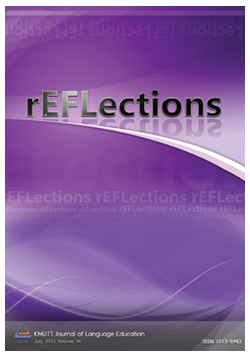Errors in Adjective-Noun Order by Thai and Chinese EFL Learners: Roles of L1 and Language Profciency
Main Article Content
Abstract
Roles of frst language transfer have been extensively researched during the past decades adopting Contrastive Analysis (CA). However, previous studies have shown that CA has failed to prove and fnd supports for language transfer. This present study examined language transfer from another perspective proposed by Jarvis and Odlin (2000) by examining adjective-noun order errors by Thai EFL learners. In previous studies, adjective-noun order errors by Thai EFL learners, which mainly used the CA, are often claimed to be caused by L1 interference. The present
study aimed to examine this claim by adopting the proposed framework by Jarvis and Odlin by Thai and Chinese EFL learners and to investigate the relationship between the adjective-noun order errors and learners’ profciency levels. Two groups of Chinese and Thai participants were purposively selected due to the special characteristics of their frst languages that met Jarvis and Odlin’s L1 transfer framework. The results revealed that both Thai and Chinese EFL learners made similar errors in the adjective noun order. The statistical test showed no signifcant differences between the number of adjective-noun order errors produced by Thai and Chinese learners (p > 0.05). Therefore, the transfer position seemed not to be
plausible. A negative correlation was found between language profciency and the number of errors learners produced. This suggests that when learners’ profciency was higher, they tended to produce fewer errors in adjective-noun order errors.


